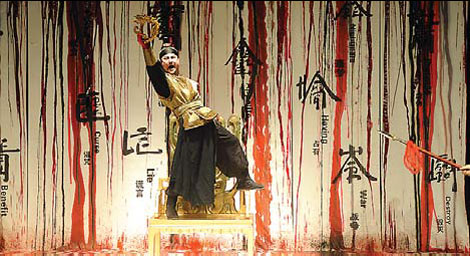
 |
|
The National Theatre of China will present Richard III, in Chinese. Provided to China Daily |
"O for a muse of fire..." Shakespeare wrote for the chorus in Henry V, inviting audiences to travel with him on a voyage of the imagination.
And the wild journeys of his plays, first traveling in English, soon multiplied into many fresh sojourns in a host of different tongues, including Chinese.
The National Theatre of China's deputy director Wang Xiaoying says Shakespeare's stories are timeless and universal. It's not strange that his plays are still produced throughout the world today.
"But it would be really marvelous to do a Shakespeare play today in his home country and especially on the stage where Shakespeare's company performed in his time," the acclaimed director says.
This spring, Shakespeare's Globe Theatre in London - built by the Bard's company in 1599 - brings together artists from around the world to perform Shakespeare's plays in 37 languages. Wang and his actors will present Richard III, in Chinese, on April 28 and 29.
It's the National Theatre of China's first visit to the United Kingdom.
"We'll show the new face of modern Chinese theater through Shakespeare's wicked horror show of power and paranoia," the director says.
The Globe Theatre first assigned him to do Henry V. But he proposed selections from Macbeth, Richard III and Antony and Cledpatra, because he loves the Bard's tragedies.
Wang admits it's a big challenge.
It's his first Shakespeare production.
"You might not believe that I've never done Shakespeare," he says, "Shakespeare is every director's 'must-do'. But I just didn't feel ready until this commission."
Wang cannot use lighting, acoustic facilities or complicated settings because the open-air theater is as natural and simple as it was 400 years ago.
It's exactly the same environment as that of ancient Chinese theater. Wang says that made him think of Peking Opera and other Chinese local operas. So, he has incorporated them in the production.
A table and two chairs is Peking Opera's unique symbolic setting. The description of many situations depends on the performances of the actors and actresses. In this Richard III, Wang sets up two tables and four chairs. And an actor lies on the table to sleep.
Wang even borrows an actress and an actor from the National Peking Opera Company to perform as imperial concubines and in a painted-face role. A live band playing traditional Chinese percussion instruments will appear onstage.
"This not only highlights the intense and horrible atmosphere but helps portray the characters' inner minds," he says.
Some roles are performed in the wooden masks from nuoxi, a thousand-year-old opera popular in South China. The director also invited internationally acclaimed artist Xu Bing to create "square-word calligraphy" for the play.
Xu devised a method of writing English words in rectangular arrangements that resemble Chinese characters. This allows one to write English using Chinese calligraphic principles.
In the play, you can see such English words as "war", "desire", "destroy", "nightmare" and "curse" written in Chinese-style calligraphy - that of "square words", to be exact.
"They're tools used to tell stories in the Chinese way. I hope foreign audiences can feel a bit of Chinese interpretation of this timeless story and like it."
chenjie@chinadaily.com.cn